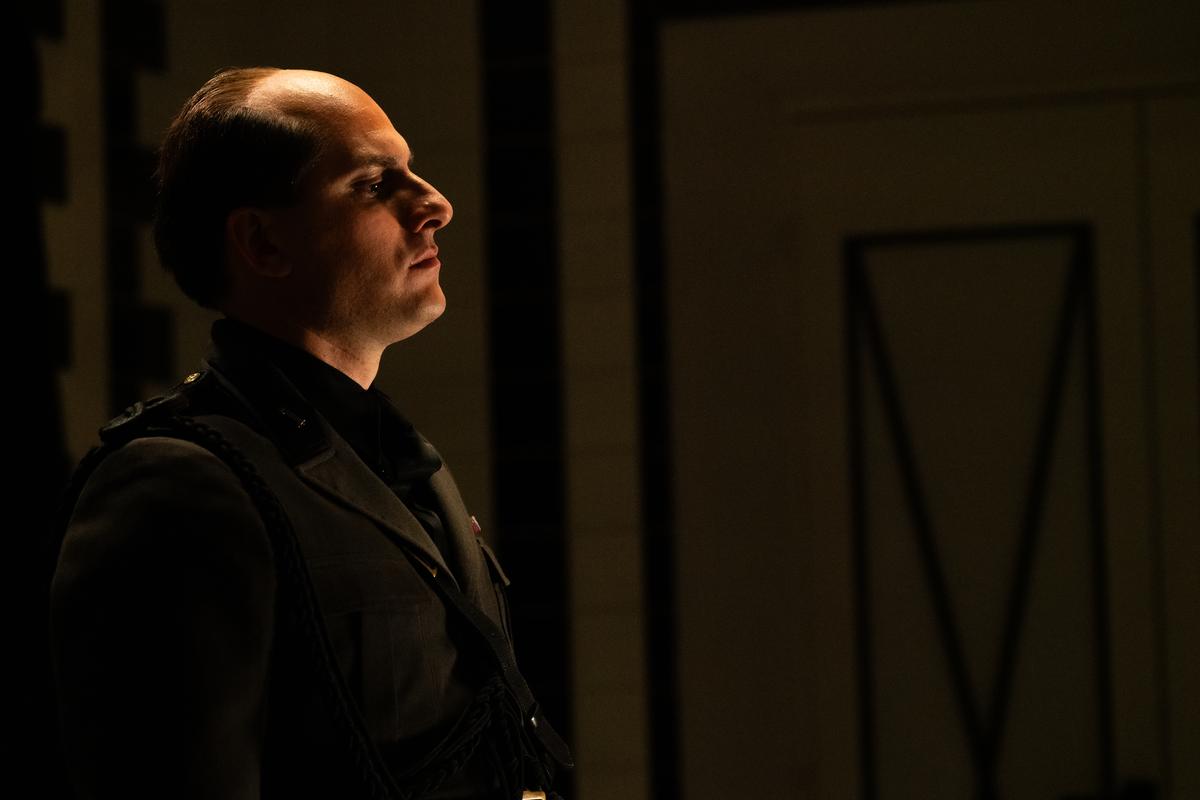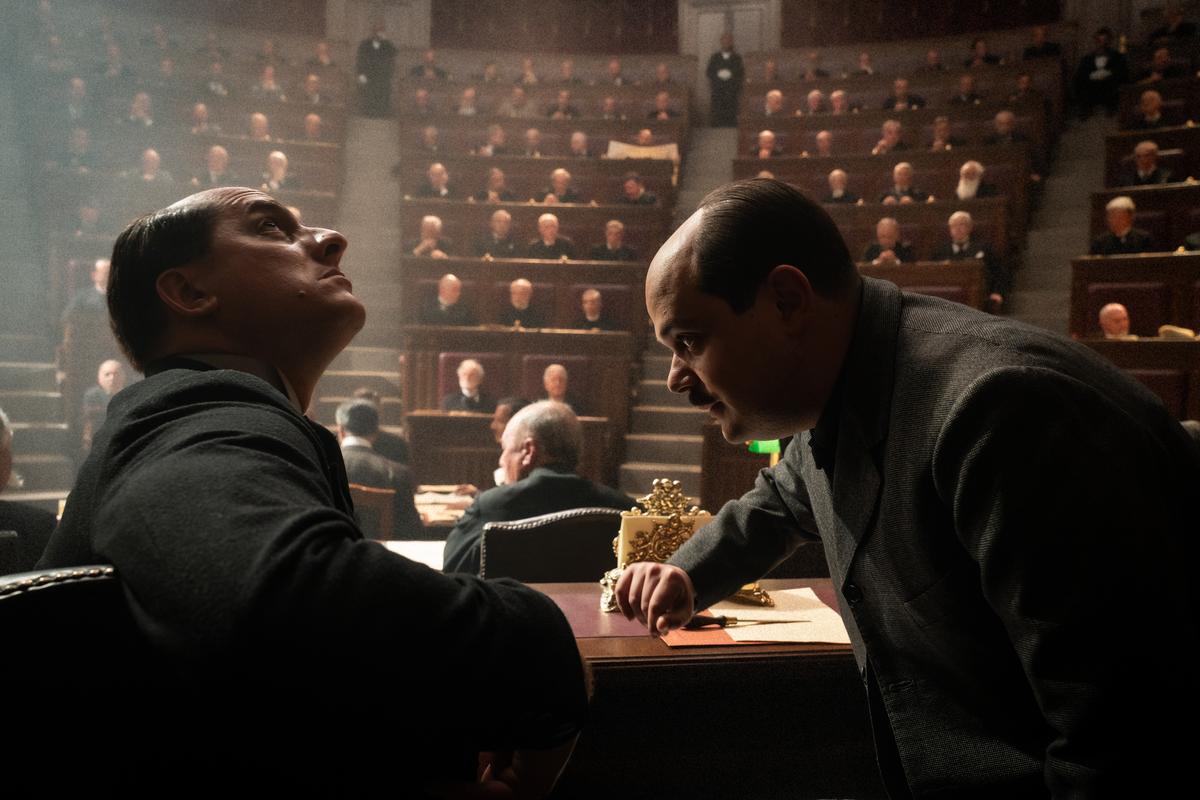The shadow of fascism doesn’t goose-step anymore. It has been slipping in under our very noses, dressed in the clothes of familiarity, feeding on discontent, and repackaging itself for modern tastes. Joe Wright, the British filmmaker behind the Oscar-winning likes of Darkest Hour, Atonement, and Pride & Prejudice, knows this. Which is why his latest adaptation of Antonio Scurati’s eponymous novel, tracing Benito Mussolini’s ascent from a rabble-rousing socialist defector to fascist dictator, unfurls as a pseudo-hagiographical warning on history repeating itself.

“I think it was important for the audience to understand why he was able to manipulate the population by force of will and charisma as he was,” Joe says. “His character had to be seductive and in fact seduce the audience as well. And his actions were so despicable that one lent into a Brechtian idea where at times we allow the audience a level of empathy, and then pull the rug out from under them and ask them to apply some critical thinking.”
That tightrope between the allure of a demagogue and the recognition of his violence runs through Mussolini: Son of the Century. The balance rests heavily on the legendary Italian actor, Luca Marinelli, who shaved his head, gained weight, and submerged himself in Mussolini’s skin.

Luca Marinelli as Benito Mussolini in a still from ‘Mussolini: Son of the Century’
| Photo Credit:
MUBI
“Luca’s one of those actors who has this kind of magical imagination,” Joe says. “He is able between action and cut to completely immerse himself in the circumstances of the character. And then at the call of cut, snap out of it. He’s about the kindest person you’re ever likely to meet, so at no point was I worried about his sanity or his soul.”
That consistently frames Mussolini as an avatar of masculinity curdled, that rings sonorous for a contemporary audience. “What we uncovered was the idea that fascism is the politicisation of toxic masculinity,” Joe says. “On that level, we were able to relate it to a lot of people within today’s society and look at ourselves as men, how we use our power.”
Even its absurdities were preserved. At one point, Mussolini swaggers across the screen in a white pilot suit and goggles, in a fit that could have been lifted straight out of Porco Rosso. The image of the Duce unconsciously cosplaying Miyazaki, embodying both a fascist and a pig in one fell swoop, was almost too on the nose. It had me in splits.
“We actually found photographs of Mussolini wearing that outfit,” Joe laughs. “He was totally absurd in so many ways. A very easy target of humour. But we had to be careful not to make him just a clown, because then it’s too easy. We allowed ourselves the occasional moment of we call back home, ‘piss taking.’”

Luca Marinelli as Benito Mussolini in a still from ‘Mussolini: Son of the Century’
| Photo Credit:
MUBI
Though the subject was Mussolini and the rise of fascism, the atmosphere was rave. Joe tapped Tom Rowlands of the Chemical Brothers to score the series with pounding, propulsive beats, which may be an unlikely choice for a 1920s political drama. But Joe insists the energy of futurism and the energy of techno are cousins.
“Back in the late 80s and 90s, I was quite involved in the whole rave culture scene in London,” he says. “When I was exploring the aesthetics of fascism and looking at futurism, I saw a lot of parallels between futurism and techno. This idea of momentum and movement and energy. I wanted to convey that atmosphere to a contemporary audience. By using Tom’s music, I wanted them to feel what it was like to really be there.”
The urgency is also deliberate. Joe wasn’t interested in treating Mussolini like a sepia-tinted relic of the past. “I think Mussolini wrote the playbook for far-right populism,” he says. “This idea that you take the legitimate concerns of the disenfranchised people and exploit them to your own ends has been played out constantly and is being played out around the world right now. Be that with Brexit, or Le Pen in France, or America, or even for you in India. They then find a scapegoat, and it’s almost like a misdirect. ‘Look over here, look over here’. Meanwhile, they’re securing their own power and enriching themselves.”
When asked whether today’s sleek, digital, libertarian-inflected far-right even resembles Mussolini’s blackshirts, Joe doesn’t hesitate. “Absolutely. I couldn’t have put it better myself. Fascism has become almost re-branded. The external signifiers look very, very different. But at its root, the methodology is the same.”

Which makes complicity as much the subject of the series as Mussolini himself. “He didn’t exist in a vacuum. He was enabled by a lot of people on a sliding scale of complicity,” Joe says. “Even the socialists at the time would stage protest by walking out of parliament, which meant they weren’t there for the crucial votes. That enabled Mussolini. The very last scene of the series is all about the complicity and silence of others.”
Silence is something Joe chose to resist in how he structured the narrative. But he insists the audience must do the heavy lifting. “When we started researching and developing the script, I was constantly drawn to the parallels between then and now, and was more didactic in my drawing of those parallels. But as we developed the show, I realised it wasn’t useful to be so explicit. It was far better for the audience to be shown the facts and for them to make up their own minds. Somehow, when we as audiences are called upon to do a little bit of work ourselves, the experience is that much richer.”

Luca Marinelli and Francesco Russo in a still from ‘Mussolini: Son of the Century’
| Photo Credit:
MUBI
For a filmmaker known for his lush literary adaptations, Son of the Century is Joe’s ugliest, angriest work (in the best of ways). It is deliberately abrasive, infused with political anxiety, and cut through with a sound design meant to provoke. Still, he frames it within a larger tradition.
“I think one of the most crucial films for me was Visconti’s The Damned, which had a profound effect in terms of its depiction of the corruption of the soul of a family,” Joe says. “I was brought up in Britain in the 70s and 80s, watching people like Alan Clarke. And then rave culture again, before it got co-opted, was very much anti-establishment; very much a movement that was counter-establishment.”
His hope, ultimately, is that audiences won’t just see Mussolini, but themselves — and the systems that continue to nurture leaders like him. That is why Joe bristles at any suggestion that fascism is a ghost.

I closed by asking Joe if Andor had crossed his radar, given that the Star Wars series could double as a shadow companion to Son of the Century. “I haven’t watched it, no. And now I’m going to have to. I’m a big fan of Tony Gilroy, so I look forward to it.”
The Empire never really stopped striking back, after all.
Mussolini: Son of the Century is currently streaming on MUBI
Published – September 11, 2025 07:50 pm IST








